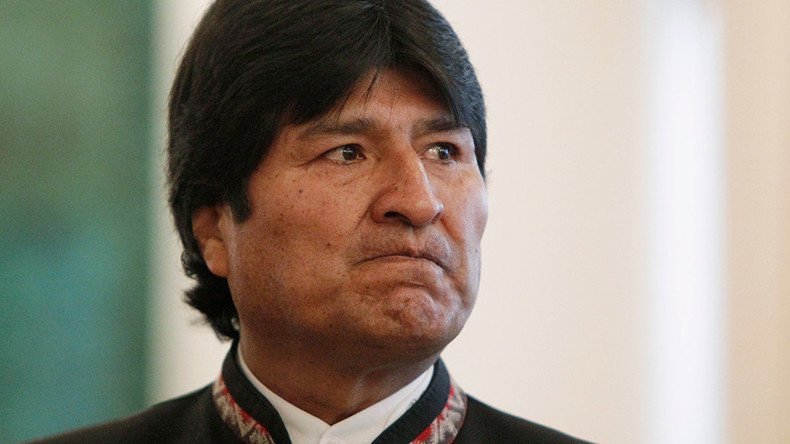Bolivian president calls US ‘threat to international law, UN’ over ‘unilateral’ Russia sanctions

Bolivian President Evo Morales slammed the US as a “threat to multilateralism, international law, the UN,” and condemned the latest round of sanctions against Russia.
EEUU nuevamente pretende imponer sanciones unilaterales contra Rusia. Éstas son contrarias al derecho internacional. Bolivia la rechaza.
— Evo Morales Ayma (@evoespueblo) July 29, 2017
“The United States again seeks to impose unilateral sanctions against Russia. They contradict international law. Bolivia rejects them,” Morales tweeted.
Con este tipo de sanciones, EEUU se ratifica como una amenaza al multilateralismo, al derecho internacional y a las NNUU.
— Evo Morales Ayma (@evoespueblo) July 29, 2017
"With these types of sanctions, the USA can be described as a threat to multilateralism, international law, and the United Nations," another tweet said.
It comes a couple of days after the US Senate adopted yet another round of sanctions, aimed at Russia, North Korea, and Iran. Now only the signature by US President Donald Trump remains before the sanctions are finally greenlighted.
The White House has stated that President Trump is satisfied with the document and “intends to sign it” shortly.
However, not everyone is siding with Washington on the matter. A recent poll conducted at the beginning of July and commissioned by Der Spiegel showed that the overwhelming majority of Germans – 83 percent of people over 18 years old – are against the new US sanctions on Russia.
The German government has also opposed the sanctions, fearing they will target the EU by extension. European companies working with Russia on various energy initiatives, such as the Nordstream II pipeline, will be targeted as well.
“It remains the case that we will not accept an extraterritorial application of these US sanctions against European companies,” German Foreign Minister Sigmar Gabriel told Der Spiegel on Friday.
German Economy Minister Briggette Zypries hinted at potential counter-sanctions and a “trade war” with Washington should the document be signed by Trump.
Austria echoed Berlin in its concerns, with the president of the Austrian Federal Economic Chamber, Christoph Leitl, saying, “Europe must not let this happen,” adding that if the restrictions against Moscow are passed by Washington, “there is no doubt that Europe will be firmly united [against them].”
German Chancellor Angela Merkel’s spokesman and Austrian Chancellor Christian Kern also condemned the bill.
On Saturday, Moscow urged Washington to revise its policy and break “the vicious circle of retaliation,” Russian Deputy Foreign Minister Sergey Ryabkov said in an interview with ABC, after Moscow decided to reduce the number of US diplomatic staff in Russia and suspend the use of several of the embassy’s facilities in Moscow.













